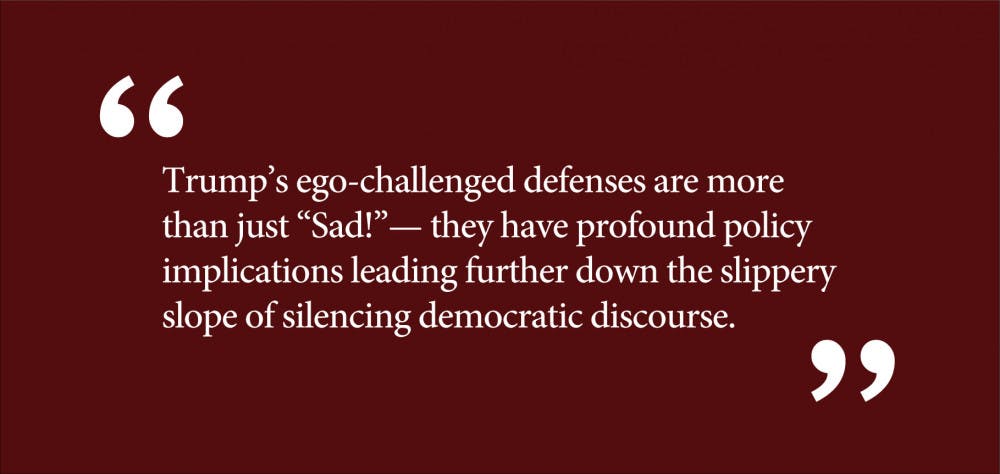What do the firing of a former Secretary of State, the hiring of an FBI director, the possibility of an onset of nuclear war with North Korea and the conspiracy against a Russian leaker have in common? They are all announcements that some U.S. citizens cannot access via President Trump’s Twitter feed. For reasons including dislike and distrust, Trump has blocked many U.S. citizens from accessing, replying to and reposting the tweets and retweets on the President’s profile. These actions are not only unacceptable and inappropriate from the man leading our nation, but they are questionably legal. Unfortunately, the framers of our constitution did not foresee the technological revolution that would take place 200 years hence and could not lay the ground rules for discourse on public and Presidential social media profiles. However, they gave important protections to U.S. citizens regarding the freedom of speech and participation in public forums.
This issue may seem cavil; however, it has consequences much wider-ranging than the touch of a finger, crossing into the realm of a constitutional foray. If, for instance, the President blocked every dissident who voiced disapproval, leaving him in a digital echo-chamber of Fox News and “patriots,” would his self-imposed ignorance impinge on the First Amendment rights of citizens to “petition to the government a redress of grievances?”
For the President to put his fingers in his ears to block the many contrary voices in contemporary society would at very least fall outside a bevy of institutional norms cemented over 200 years in a democracy prioritizing healthy discourse and debate. But what does the Constitution say if Trump seeks to block expression by only a few dissenters? The Supreme Court has upheld in numerous cases that citizens have a right to participate in and take full advantage of public forums, which does not necessarily have to be a physical space. Trump, through the nature of his tweets, has established his feed as a public forum. The Department of Justice, looking to explain or qualify the President’s rash online statements, describes the President’s tweets as “official statements of the President of the United States.” Are Trump’s blocking tactics violating the rights of these barred individuals from participating in a designated public forum?
Some see clear constitutional violations and have challenged Trump’s right as “Tweeter in Chief” to block users. The Knight First Amendment Institute sued the President for a violation of the First Amendment on behalf of seven plaintiffs whom Trump had blocked. In May of 2018, a federal judge ruled in favor of the plaintiffs. After over a week of hesitation, Trump unblocked these specific users. However, he continues to block many other users, from ordinary citizens to a Veterans organization with thousands of followers itself. Seeking the last word, Trump’s Department of Justice has appealed the case citing “uncharted waters” and dangerous implications for the First Amendment. Obviously, Trump has not respected the judge’s ruling that he cannot both keep his Twitter as a public forum for official statements and block those whom he finds abrasive to his ego.
Yes, it is possible for someone to circumvent one of Trump’s digital hurdles by logging out of their account and ghost-auditing Trump-World’s latest tweetstorm. But to Trump, their silence would remain golden. This is the opposite of what our constitution envisioned. Even in this other dimension which Trump has created, citizens have legal rights to access public forums and to engage with their public officials. Trump’s ego-challenged defenses are more than just “Sad!” — they have profound policy implications leading further down the slippery slope of silencing democratic discourse.
Emily Miller ’19 can be reached at emily_miller@brown.edu. Please send responses to this opinion to letters@browndailyherald.com and other op-eds to opinions@browndailyherald.com.





